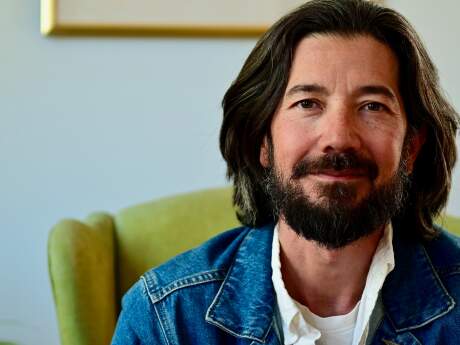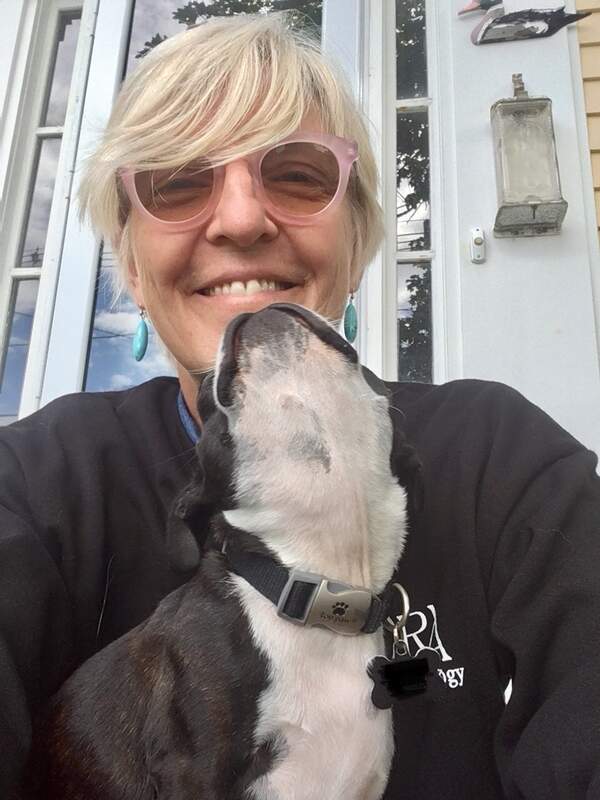Stopping By
Stopping by with Maureen N. McLane
Maureen N. McLane is a poet, memoirist, critic, and educator. She has published seven books of poetry, including This Blue, Finalist for the National Book Award. She is also the author of an experimental hybrid of memoir and criticism (My Poets), two monographs on British romantic poetics, and numerous essays on romantic-era and contemporary literature and culture. Her poems have been translated into Italian, French, Greek, Spanish, and Czech. Her most recent book is More Anon: Selected Poems (Farrar, Straus & Giroux, 2021). She is Professor of English at New York University.
What is the last thing that moved you?
I was in London this spring, and a lot of what I took in was by British or European artists. I just finished Sarah Moss’s novel Ghost Wall and thought it excellent: taut, fleet, dark, and ramifying in its implications. I’ve seen it glossed as a Brexit novel, but that seems too bald and limited – it’s brilliant on gender and violence, and on the brutalities of certain intimacies, familial and communal. And its shimmering between prehistory and the contemporary moment is wonderfully done. Other highlights—and apologies for extending beyond your requested “last thing”! In reading: Claire-Louise Bennett’s Pond and Checkout 19; in listening: Arooj Aftab’s Vulture Prince; in reading/listening: “Versions from the Popol Vuh: an excerpt,” by Jesse Nathan, Josué Coy Dick, and Juan Coy Tení—and their discussion with Srikanth Reddy on the Poetry magazine podcast.
What is a book that changed or greatly influenced your life?
I could say that Rilke’s “You must change your life” (“Du mußt dein Leben ändern”) endlessly points to the ways I have not changed my life. A negative space of influence? But also, maybe, a species warning and verdict.
Certain works showed me, or shadowed forth, how my life (or a life) could, and in some ways did, change. Several works have accompanied me through many life phases, resonating differently at different junctures: Elizabeth Bishop’s Complete Poems, translations of Sappho (by Jim Powell and Anne Carson, especially), Gertrude Stein’s works (early on, “Tender Buttons,” later on, Everybody’s Autobiography, more recently, “Stanzas in Meditation”). Crucial for my sense of thought and possibility were readings in psychoanalysis—some of Freud’s writings, certainly D. W. Winnicott’s, and work by contemporary thinkers and essayists (Jacqueline Rose, Adam Phillips, Celia Brickman). This overlapped in complicated ways with readings in various feminisms and queer theory—Gayle Rubin, Eve Sedgwick.
From another direction, and more recently, participating as a player/interpreter in two of artist Tino Sehgal’s works—This Situation and This Progress—gave me a lot to think about, in terms of structuring situations, serious play, political economy, and styles of life.
Choral singing, vocal music, is a core throughline in my thinking about life and work, even if I am myself not pursuing it right now—questions of community, harmony, voicing, silences, shaping time together.
What is your first memory of poetry?
Probably my father singing a children’s rhyme/song, “She sailed away/one sunny summer day/on the back of a crocodile”; or his declaiming of Lewis Carroll’s “Twas brillig and the slithy toves.” Song and nonsense: key threads!
How has this last year changed you, and what is something that you will take with you into a post-pandemic world?
I don’t yet know. I also don’t know that a post-pandemic world is where we’re heading. I realized in the past year that I needed consciously to develop certain meditation and breathing practices; I memorized a few poems to return to when I wake in the middle of the night—instead of reaching for the phone. So, Emily Dickinson’s coming with me into a possibly post-pandemic world. And so is cartoonist Lynda Barry – her "four-minute diary" practice and her concentration spirals, from her brilliant book Syllabus: I started doing this with students at the start of classes, and it’s something we all found valuable, and I’ll definitely continue with that, both on my own and in company. Sponsoring modes of attention and focus and stillness: that is something worth doing.
Who or what is your greatest creative influence?
Other poetry, other writers and artists, open ears, the weather, walking, eavesdropping. The dead. Talking with my partner and with friends.
If you were to choose one poem or text to inscribe in a public place right now, what would that be? And where would you place it?
In every public school classroom and public transportation hub:
“remember/you can have what you ask for, ask for/ everything”
– Diane Di Prima, Revolutionary Letter #19
“Damn braces. Bless relaxes.”
– William Blake, “Proverbs of Hell,” The Marriage of Heaven and Hell
What do you see as the role of art in public life at this moment in time?
I suppose I would think about roles, not a unilateral “role.” Cornelia Parker had a beautiful statement on this in her retrospective at Tate Britain: “This is the time we all need to politically engage. We need art more than ever because it’s like a digestive system, a way of processing.” She does this in specific, collaborative projects like the remarkable Magna Carta (An Embroidery).
Some other roles for art in public life: to complexify, to keep a space open for surprise, for quiet; to attend, to hold (open); to memorialize; to mobilize. You see my impulse is to pluralize, not streamline.
What do you want people to take away from your work?
Whatever they wish to!
Are you working on anything right now that you can tell us about?
I just finished final edits on a book of poems, What You Want, that will appear in spring 2023; in the coming months I’m aiming to round off a longstanding “birthday poem” project, in which I asked 50 or so friends to commission a poem from me—as a way of thinking about and with them, doing something for another, with another, via a poem. So, a number of multi-year projects and undertakings are coming to a kind of conclusion . . . in the past several months, I seem to be working on some kind of daybook, inchoate, emergent; and I’m hoping this summer to return to a translation project with my partner, working with ancient Greek funerary and amatory epigrams.
What are you hopeful for this year?
Better stars, better alignments, fewer screens, more mutual aid.


